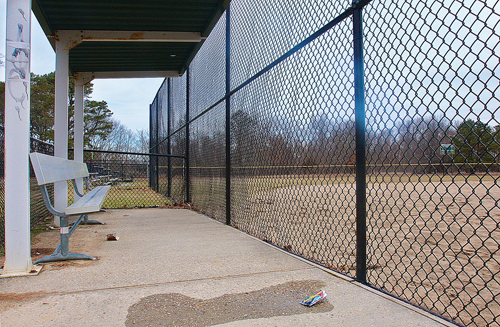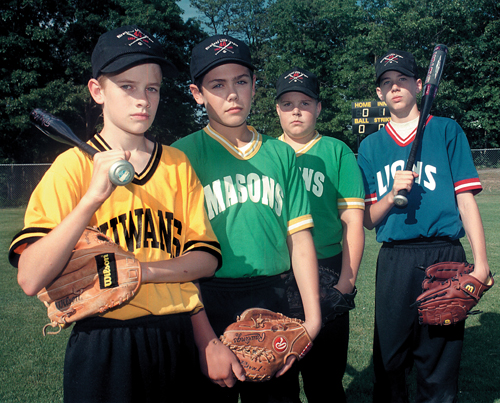Sign of the times in Flanders as Little League folds

In 1971, just south of the Peconic River and the turf of the long-established Riverhead Little League, a separate four-team league was formed in Flanders. It was something for the community to rally around, as much a part of its identity as the Big Duck or the Men’s Club.
But slowly, the Flanders Little League waned. Fewer children were interested in joining and sponsors dried up. Four teams became two.
The popularity of other sports had eaten into its base of players, which was already shrinking as fewer families moved into the area and demographics of the hamlet changed.
Before a lackluster February registration drive, volunteers urged the community to come out, give their time and support the program. But only about 40 players signed up, the league president said.
In a late-night text last month, Flanders Little League officials notified the Riverhead Little League that it would need to accommodate its players, posted a short, six-sentence goodbye on its social media page and dissolved the league.
But as some mourn the unexpected demise of the once-popular league — and while the area’s historical society also flirts with closing its doors — community spirit for some of Flanders’ other civic institutions remains strong.
League president Wayne Ford said it had nearly closed in the past for lack of turnout. “For the past 10 years, we’ve been having less and less kids interested in baseball,” he said in an interview. “Every year we prepare for [to close]. We knew last year was close.”
Despite signs that the league was struggling, officials wrote to supporters Feb. 17 saying the league would remain in operation in 2014. Ten days later, it folded. The league could have continued as a “really crappy league” this year, Mr. Ford said, but officials decided to shut it down and give players a chance to join Riverhead’s larger and more expensive Little League.
The merger has been sanctioned by Little League International and had been discussed for months before.
“It was in the best interest of the kids,” Mr. Ford said. The decision to close wasn’t an easy one, since the league meant so much to those who ran it.
“That was pretty much all we had growing up,” he said. “That was the only thing we had that was ‘Flanders.’”
Any players already registered for this season will receive reimbursement of their payments, he said. The league’s equipment has been offered to Riverhead’s league and any leftovers will be donated.
Southampton Town Councilman Brad Bender, a Flanders resident, said it was a shame the league has been shuttered.
“It’s something I’ll definitely miss, and something a lot of other people will miss too,” he said. Mr. Bender said the field at Iron Point Park will remain a ballfield and will likely be used by Riverhead’s Little League for some games.
“There’s still a heavy interest in baseball in that facility,” he said. “They’re going to keep the field up. They’re going to keep it as it always has been, regardless of whether the Little League is there or not.”
Mr. Bender said the town will also look into smoothing out the bumpy dirt road that leads to the park to make it easier for residents to drive in.
“It’s so unfortunate, but I guess they’re putting a mechanism in place so that the kids still get to play,” he said.
The end of the program came as a shock to those who volunteered and played.
“I was totally devastated,” said former Little League president Fran Cobb. “I never thought that I would see this day.”
Ms. Cobb said the Little League, which she ran in the mid-2000s, was “the heart of the community.”
“We have our own town, we have our own league,” she said. She cited the decision four years ago to reduce the league’s size from four teams to two traveling teams as the main reason for the League’s demise.
“That’s the worst thing they could have ever done,” she said, adding that the league had been mismanaged.
But others say the Little League’s issues had more to do with the way Flanders was changing, with more second-home owners and migrant workers moving into the region.
Gary Cobb, president of the Flanders Historical Society and Fran’s husband, said the community has always lacked the deep roots of surrounding villages.
“There’s not a deep-rooted ancestry in Flanders,” he said. “The old family names like Penny and Brown and Squires and Fanning are almost nonexistent … There’s an enclave of us, but we’re slowly becoming outnumbered.”
The rise of out-of-towners moving into Flanders has made it difficult to drum up support among locals, he said. The Flanders Historical Society itself will likely close down this June from lack of interest when its charter expires.
“For anyone who is as passionate about Flanders as me, it’s very frustrating,” said Mr. Cobb, who now lives in East Hampton. “We thought it was such a good thing. I still think it’s a good thing.”
Young people and families are moving out of the area while others seeking more affordable housing move in, meaning there are fewer potential players for a baseball league, he said. The popularity of soccer among members of the hamlet’s growing Hispanic population has played a large role, he said, and many newcomers have opted to put their kids in lacrosse instead of baseball.
“I think it’s all connected. It’s just an indication of the times here, sadly. I think its our heritage going down the tubes. Our pastimes — not just sports, but fishing, farming — they’re going by the wayside,” Mr. Cobb said.
Others who played in the league said they saw the same changes in the hamlet.
“It’s a shame,” said Mike Sauter, a former player in both the Flanders and Riverhead Little Leagues who now volunteers as a firefighter. “Flanders is a small, tight community, but you don’t have the population to support [a league].”

Mr. Sauter played in the Flanders league for three years, until he was 10, and caused a stir in the community when he and three other baseball players switched allegiances and joined the Riverhead Little League in search of better competition.
He said during his time in the league, the sport’s popularity was already decreasing.
“Baseball lost a lot of players to lacrosse,” he said. “This merger is in the best interest of the kids to be able to play the sport. We don’t want to lose America’s pastime.”
But numbers show that Flanders is most likely not alone in seeing a decline in participation. A January Wall Street Journal article noted that nationwide Little League participation in 2012 fell nearly 7 percent from its 2008 numbers.
Nonetheless, Mr. Sauter still recalls his time in Flanders, where he “first picked up a ball and swung a bat.”
“I remember all my first catches and diving plays, sliding into home in Ludlam,” Mr. Sauter said. “I’ll always have those memories of the Little League.”
The league may be no more, but officials with the Big Duck tourist attraction and the Flanders Fire Department say there’s no danger that they’ll lose the community’s support.
The Big Duck relies on outside tourists to generate income, though only a portion actually goes to the nonprofit group that supports it, said Friends of the Big Duck vice president Doris Schneider.
Since the duck itself is owned by Suffolk County, any proceeds from Big Duck merchandise goes there. Only a percentage of sales of “Friends of the Big Duck” souvenirs goes to the group, she said.
The Big Duck relies on the strong response from Flanders locals at fundraising events to stay afloat, Ms. Schneider said.
“We’re doing pretty good,” she said.
The Flanders Fire Department, meanwhile, has seen near record-high membership, said Fire Chief Joe Petit.
“I think we have around 56 members. Usually it’s around 10 less than that,” he said. Not only does the department have more members than normal, but they’ve also had a couple new volunteers join each month.
“It’s been a steady flow for the past few years or so,” Mr. Petit said. The fire chief is very familiar with the Flanders Little League: His older son played there for two years, while his younger son was a T-ball and minors player.
But his son also played lacrosse, and eventually chose to pursue that instead.
“I know how difficult it is to juggle your son, your kid with two sports,” he said, adding that more options are available now for athletic kids.
“They’re playing soccer, they’re playing lacrosse, they’re playing baseball,” he said. “There’s so many other things going on in the spring.”
Losing the Little League, he said, was like Flanders losing a part of its identity.
“I think Flanders tries to fight for its own identity,” Mr. Petit said. “They want something that’s theirs, and the Little League was theirs … The Flanders people really cherish that. They want something of their own.”
Flanders may have lost its league, but some say the opportunities for players in Little League have gotten better.
Riverhead Little League president Tony Sammartano said that while shutdown of the Flanders league was surprising, he thinks the merger will be beneficial for his league and the players.
“The kids go to school together. They should play together,” he said.
Vince Taldone, president of the Flanders Riverside Northampton Community Association, was happy to hear that Flanders’ kids would have a new home in a new league.
“It’s sad because you lose a little bit of your civic pride,” Mr. Taldone said. “But if I remember correctly, when I was a kid, I just wanted to play.”








